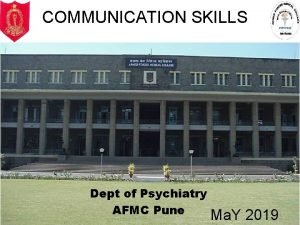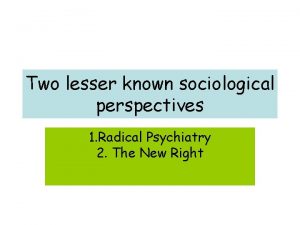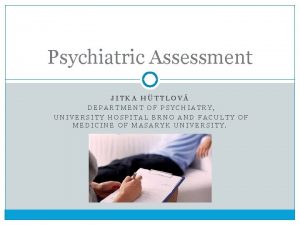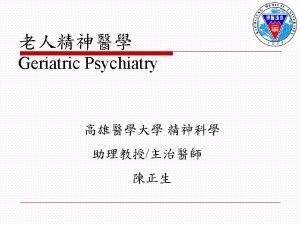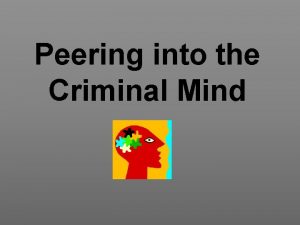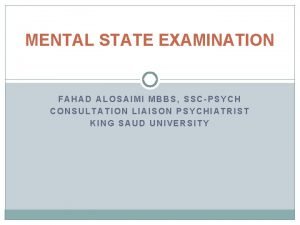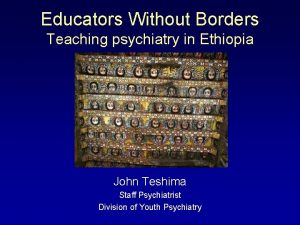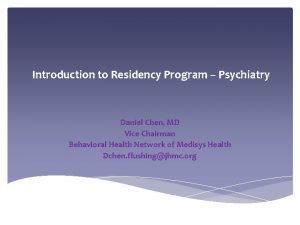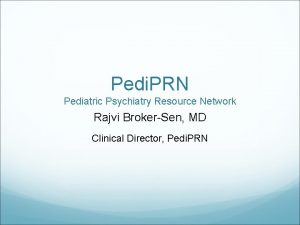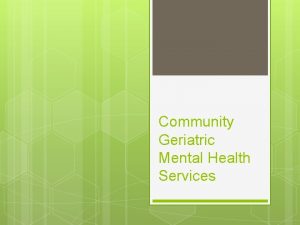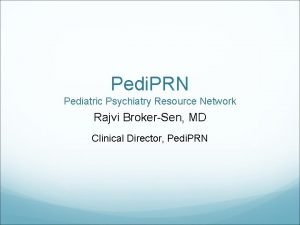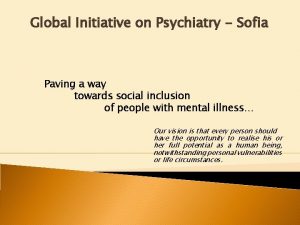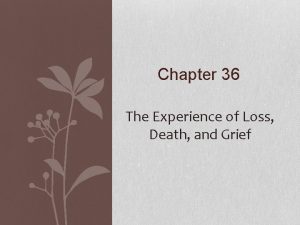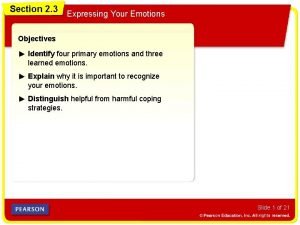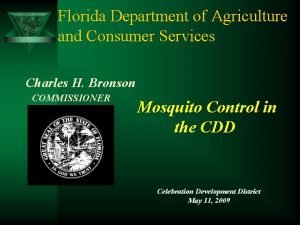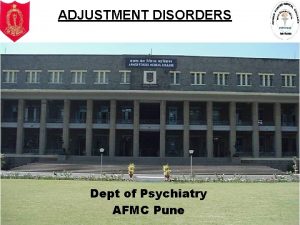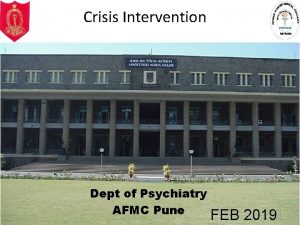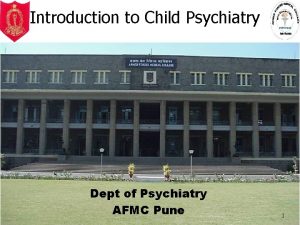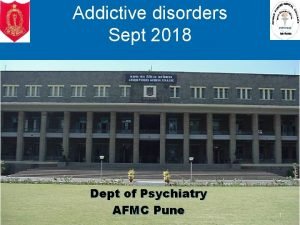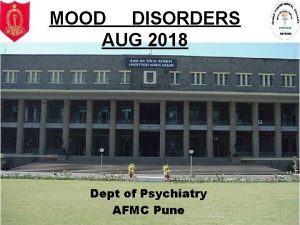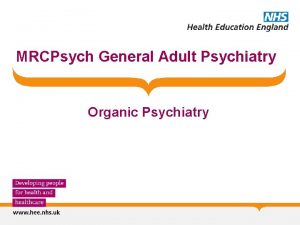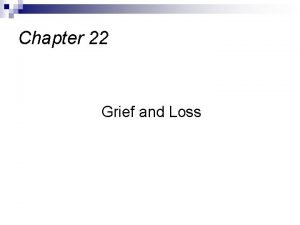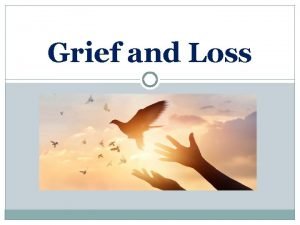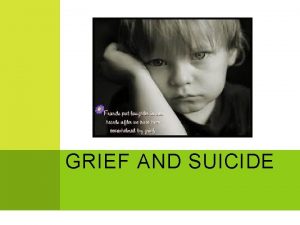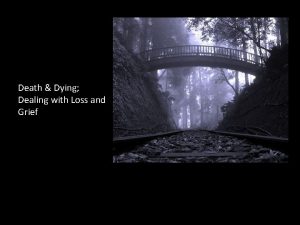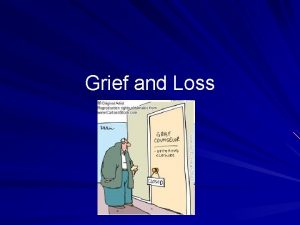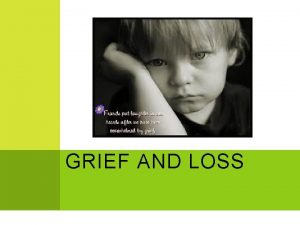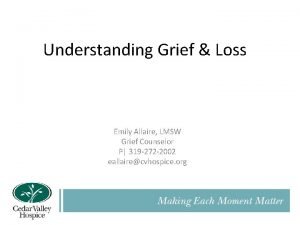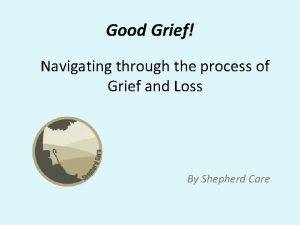Grief and Mourning Dept of Psychiatry AFMC Pune





























- Slides: 29

Grief and Mourning Dept of Psychiatry AFMC Pune FEB 2019 1

Case Vignette • Mrs A, a widowed mother lost her only son aged 24 years in a road traffic accident on 24 Jan 2018. • After the accident, she refused to accept that her son had died and kept asking the doctor to continue with resuscitation efforts. When the doctor left her alone with the body, she behaved as if the son was alive and continued to ask him to get up. • After few days of the funeral she held herself guilty for allowing her son to buy a bike. Felt like crying all the time with choking, also had sleep problems with excessive dreams about her lost son. She remained preoccupied with his thoughts. • Often heard his voice fleetingly calling her and felt as if he was just about to reach home after work. She often mistook similar looking person as her son when she went to market. • On his death anniversary, she felt extremely sad and hopeless and contemplated ending her life. Since she was socially withdrawn she was brought to the psychiatrist.

SLO • Understanding basic terms related to death dying and bereavement • Identify typical emotions involved in the grieving process. • Identify and facilitating the mourning process • Discuss how to develop a healthy outlook concerning death.

Important terms • Grief: Subjective feeling following death of a loved one (i. e. Feeling sad, hopeless, anxious etc) • Bereavement : State of being deprived of someone due to death. • Mourning : Process by which grief is resolved. (i. e. By cognitive restructuring, performing rituals, crying etc)

Grief • The pain, discomfort, mental and physical feeling that most people feel following the death of a loved one. • People suffer grief at the loss of anything. It doesn’t just have to be death.

Grieving Process It's only when we truly know and understand that we have a limited time on earth -- and that we have no way of knowing when our time is up, we will then begin to live each day to the fullest, as if it was the only one we had. ~Dr. Elisabeth Kübler-Ross

Stages of grief : Elizabeth Kubler Ross 1. Disbelief, Denial and Shock ( Min to wks) 2. Anger (Days to wks) Initial Reaction 3. Bargaining ( wks/mths) 4. Depression : Discomfort and withdrawal (wks/mths) 5. Acceptance : Recovery and reorganization (Mths/Yrs) * Imp: However, the patterns are extremely varied. The stages do not follow the same pattern in every case

Shock, Denial, Disbelief • Occurs between the time of death and time of the final arrangements • During “Shock” one may even deny that the death has occurred. • In this stage we refuse to believe what has happened. We try in our mind to tell ourselves that life is as it was before our loss. • We can even make believe to an extent by re enacting rituals that we used to go through with our loved one.

• We set an extra plate at the table. • We expect them to be there when we get home. • We flash back to memories and conversations. • These are all part of this stage.

Anger • We get angry why loss happened • The anger can manifest itself in many ways • We blame others for our loss • We become easily agitated having emotional outbursts • We can even become angry at ourselves • Release of this anger is essential!

Bargaining • Bargaining can be with ourselves or if you are religious with your god. • Often we will offer something to try to take away the reality of what really happened • We may try to make a deal, to have our loved one back as they were before the tragic event occurred • It is only human to want things back as they were before

Depression • Depression is a very likely outcome for all people that grieve for a loss. • This is the most difficult of the stages to deal with. • There can be a feeling of listness and tiredness. • Outbursts of tears may occur.

• You may feel like there is no purpose to your life anymore. • You may feel like you are being punished. • Pleasure and joy may be difficult to express. • There may even be thoughts of suicide. • If you at any time in this stage, feel like doing yourself harm, professional counseling should be sought.

Differentiate: Grief & Depression S. No Symptom Grief Depression 1 Onset Clearly related to loss Anytime 2 Morbid feeling of guilt, worthlessness, hopelessness, suicidality Guilt related to the lost one Hopelessness, worthlessness, suicidality : Not seen Guilt related to self , Hopelessness, worthlessness, suicidality : Maybe present 3 Duration/course < 2 month Max 6 month Gradually resolves, occurs in waves Generally much longer Gradually worsens 4 Impairment Much less Much more 5 Sympathy/comforting Useful Not much useful 6 Antidepressants Not really required Generally required

Acceptance • This is the final stage of grief. • It happens when you know that you have to go on • You can accept your loss and now be able to regain your energy and goals for the future. • It may take some time to get to this stage. . but you will get there!

Resolution • One starts living a regular life.

Anticipatory Grief • The mourning process that occurs prior to death in cases of terminal illnesses. • Spent Grief: The grief has occurred even before death of loved one

Pathological Grief • Duration more than 6 months • Delayed : onset more than 2 weeks of loss • Inhibited grief: continued state of denial • Excessive guilt, anger or religiosity leading to significant impairment

Complicated Grief • Associated delusions, hallucinations • Severe depression with suicidal tendency • Hysterical symptoms of excessive laughing, crying or severe physical symptoms

Four Basic Needs of the Bereaved

Companionship

Ventilation of Feelings

TIME

Time Alone

Self help strategies 1. Attending support groups 2. Therapy with mental health professional 3. Writing a blog 4. Eating Well 5. Exercising 6. Getting enough rest 7. Avoid unhealthy behaviors: Smoking/Drinking

What are some appropriate things to say to the bereaved? • "It's Ok To Cry" • “I just wanted you to know I am thinking about you and that I care. "

What should you avoid saying to the bereaved? • Cheer up • Forget him/her • He/She is better off dead • Now what will happen to you ? • Call me if you need me

Take home message • Grief and Grieving process(Mourning) are normal processes designed to overcome loss of a loved one. It occurs in stages. • Generally no specific treatment is required but intervention may be warranted in pathological and complicated grief • Grief has to be distinguished from Depressive Disorder

Questions…. . Comments…. . (welcome) 29
 Afmc organizational chart
Afmc organizational chart Afmc student portal
Afmc student portal What is afmc
What is afmc Radical psychiatry sociology
Radical psychiatry sociology Mse psych
Mse psych Geriatric psychiatry definition
Geriatric psychiatry definition Who is this
Who is this Mse appearance
Mse appearance Internal medicine shelf percentiles
Internal medicine shelf percentiles European psychiatry
European psychiatry Psychiatry in ethiopia
Psychiatry in ethiopia Jamaica hospital psychiatry residency
Jamaica hospital psychiatry residency Define criminal psychology
Define criminal psychology Addiction psychiatry expert witness
Addiction psychiatry expert witness Pediprn
Pediprn Community geriatric psychiatry
Community geriatric psychiatry Core psychiatry
Core psychiatry National network of child psychiatry access programs
National network of child psychiatry access programs Asclepiades father of psychiatry
Asclepiades father of psychiatry Feigned insanity forensic
Feigned insanity forensic Global initiative on psychiatry
Global initiative on psychiatry Lesson 3 coping with loss and grief
Lesson 3 coping with loss and grief Chapter 36 loss and grief
Chapter 36 loss and grief Seven stages of grief
Seven stages of grief The three learned emotions are grief shame and
The three learned emotions are grief shame and Dept of finance and administration
Dept of finance and administration Florida dept of agriculture and consumer services
Florida dept of agriculture and consumer services Florida dept of agriculture and consumer services
Florida dept of agriculture and consumer services Fl dept of agriculture
Fl dept of agriculture Welcome to pune
Welcome to pune


